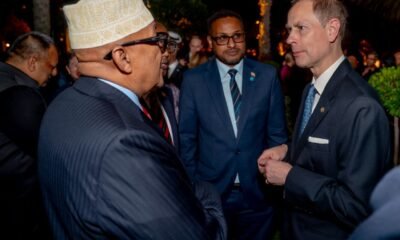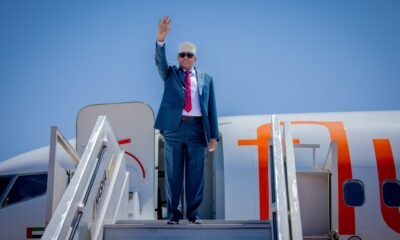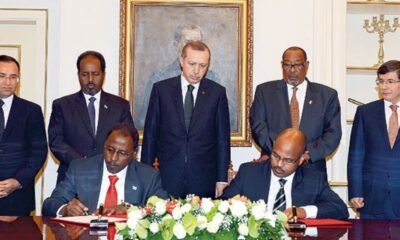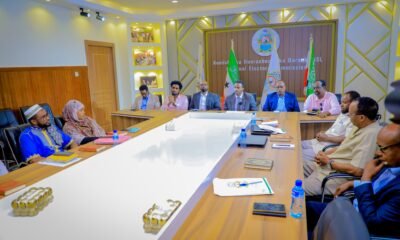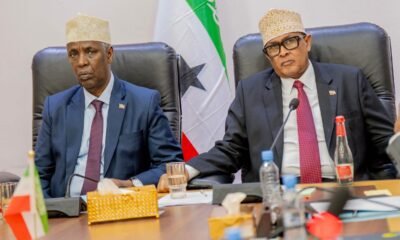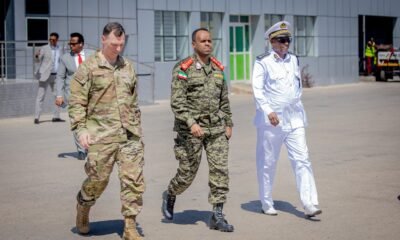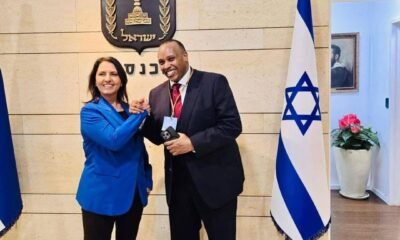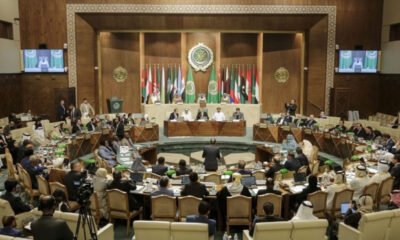Report
Brenthurst Foundation Observes “Free, Fair, and Credible” Somaliland Elections Amidst Challenges
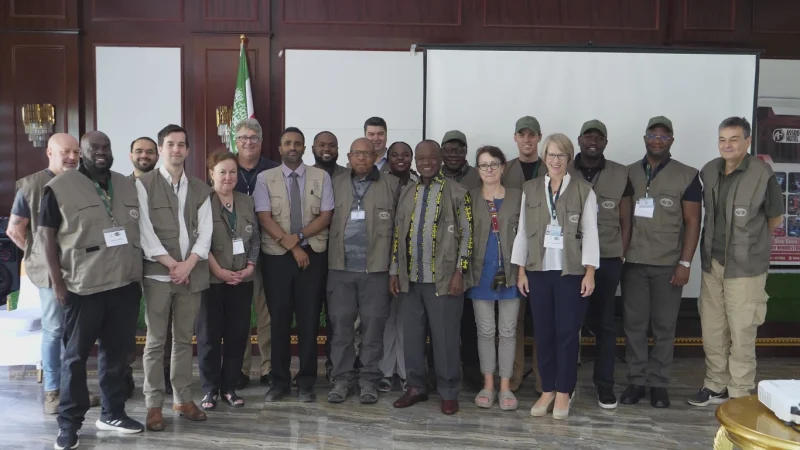
The Brenthurst Foundation has released its comprehensive report on Somaliland’s 2024 presidential and political organizations elections, held on November 13. The elections marked the ninth competitive poll since Somaliland declared independence from Somalia in 1991. The mission highlighted the significant strides Somaliland has made in fostering democratic practices in a volatile region, while also addressing the logistical and political hurdles that accompanied this year’s elections.
Historical Context: A Legacy of Resilience
Since its self-declared independence, Somaliland has emerged as an outlier in East Africa, cultivating a functional democratic system despite the lack of international recognition. Its historical journey—from the destruction wrought by Somalia’s Siad Barre regime to the establishment of an inclusive multiparty system—has earned it a reputation as a beacon of stability in a tumultuous region.
Somaliland’s three-party system, enshrined in its constitution, continues to serve as a cornerstone of its democratic framework. However, this election faced heightened scrutiny due to political tensions stemming from delayed polls and agreements with neighboring Ethiopia.
Key Features of the 2024 Election
This year’s elections were distinct in several respects:
- Simultaneous Presidential and Party Elections: For the first time, elections determined both the presidency and the recognition of political parties, with seven new associations vying to replace the incumbent three-party slate.
- Delayed Timeline: Opposition parties criticized President Muuse Biixi Cabdi for extending his term, initially scheduled to end in 2022, alleging a deliberate delay to maintain power.
- Technological Advancements: The deployment of IRIS biometric verification at over 1,000 polling stations marked a significant technological milestone, although its coverage remained limited to urban areas.
Despite these challenges, 1.2 million registered voters participated in the process, with more than 13,000 officials facilitating the election across 2,648 stations.
Election Day Observations
The Brenthurst Foundation deployed 20 international observers across four key districts: Hargeisa, Borama, Burao, and Berbera, covering 26% of the electorate. Observers noted the following:
- Peaceful Conduct: Voting was largely orderly, with polling stations opening on time and being efficiently managed. The prominent participation of women, both as voters and officials, was a standout feature.
- Adherence to Procedures: Voter identification, ballot allocation, and counting processes were rigorously followed. Party agents actively monitored and verified results at polling stations.
- Technology in Action: The IRIS biometric system functioned effectively in most locations, with staff cross-checking entries against physical voter rolls to ensure accuracy.
- Security Challenges: Minor incidents of crowd control occurred in Hargeisa and Burao, requiring police intervention. However, these disruptions were swiftly managed, allowing voting to proceed.
Assessment and Credibility
The report lauded Somaliland’s electoral commission for conducting a transparent process despite limited financial and logistical resources. The elections were deemed “free, fair, and credible,” with improvements noted in areas such as voter verification, lighting, and the efficiency of counting compared to the 2021 elections.
However, the mission acknowledged areas for improvement, including the exclusion of underage voters, enhanced crowd control, and better accommodation for voters with disabilities.
Recommendations for Future Elections
The Brenthurst Foundation proposed 11 recommendations to strengthen Somaliland’s electoral process:
- Maintain NEC Independence: Ensuring the commission’s impartiality remains critical.
- Equal Treatment of Observers: Local observers should receive the same support as international missions.
- Address Underage Voting: Voter rolls should be scrutinized to eliminate discrepancies.
- Ban Election-Day Campaigning: A clear prohibition on politicking during voting would enhance integrity.
- Expand Biometric Coverage: The IRIS system should be extended nationwide and supported with reliable power sources.
- Improve Crowd Management: Better marshaling outside polling stations is essential to prevent crushes.
- Enhance Transparency: Publishing polling station results on-site would align with global best practices.
- Monitor Political Financing: Transparent reporting of funding sources is necessary to level the playing field.
- Promote Policy-Based Campaigning: Candidates should focus on issues rather than identity-based politics.
Challenges and Regional Dynamics
Somaliland’s agreement with Ethiopia earlier this year to lease coastal land near Berbera sparked tensions, both domestically and with Somalia. The report highlighted concerns over external funding influencing opposition parties and the resulting destabilization of the political landscape. Despite these pressures, the election demonstrated Somaliland’s resilience and its commitment to democratic ideals.
Conclusion
The Brenthurst Foundation commended Somaliland for its achievements in holding credible elections under challenging circumstances. While external recognition of its independence remains elusive, Somaliland continues to set an example for democratic governance in the Horn of Africa. Strengthening electoral processes and addressing political tensions will be vital as the region looks to the future.
Report
UN Says RSF Committed War Crimes During Capture of al-Fashir in Sudan
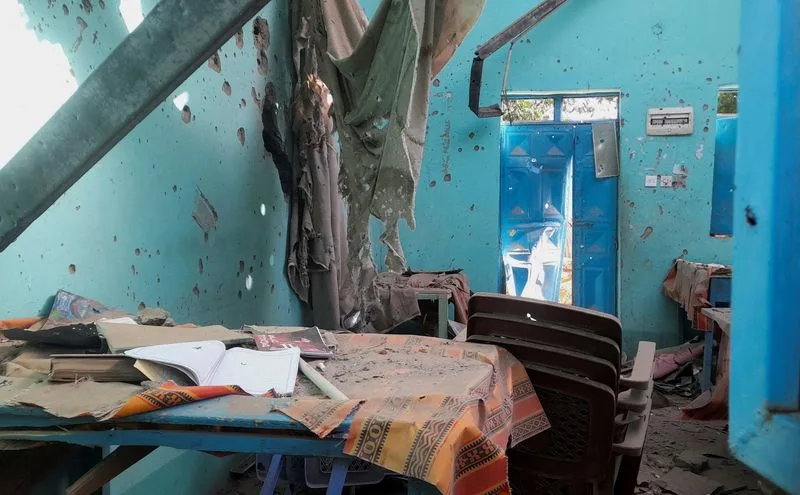
More than 6,000 killed in three days. A new UN report accuses Sudan’s RSF of atrocities that could constitute war crimes.
The Office of the United Nations High Commissioner for Human Rights said Friday that violations committed by Sudan’s Rapid Support Forces (RSF) during the capture of al-Fashir amount to war crimes and may constitute crimes against humanity.
Al-Fashir, the capital of North Darfur state, fell to RSF fighters in October 2025 after a prolonged siege marked by intense fighting and reports of mass killings.
According to a new report by the UN Human Rights Office, investigators documented more than 6,000 killings in the first three days of the RSF’s offensive following the siege. The findings are based on interviews with more than 140 victims and witnesses conducted in Sudan’s Northern State and in eastern Chad late last year.
The report describes “widespread atrocities” carried out during the assault, including summary executions and attacks on civilians. It concludes that the scale and pattern of violations may amount to war crimes and possible crimes against humanity under international law.
UN High Commissioner for Human Rights Volker Turk renewed calls for all parties to Sudan’s conflict to prevent further abuses by forces under their command. He also urged countries with influence over the warring sides to take immediate steps to halt the flow of weapons and military support.
“This includes respecting the arms embargo already in place, and ending the supply, sale or transfer of arms or military material to the parties,” he said in a statement.
Sudan has been engulfed in conflict between rival military factions since 2023, with Darfur once again emerging as a focal point of violence. Rights groups have warned that the scale of atrocities risks deepening an already severe humanitarian crisis and entrenching impunity in the region.
A Roadmap to Recognition
Crisis in Minnesota, Solution in Hargeisa

Al-Shabaab’s Money Trail Hits the U.S.—And Somaliland Holds the Key.
The alleged diversion of billions of dollars from U.S. welfare programs into a shadowy pipeline potentially feeding the terrorist group Al-Shabaab has done more than ignite a political firestorm in Minnesota. It has exposed a deeper, long-ignored strategic failure in U.S. and Western policy toward the Horn of Africa.
When Minnesota’s Republican congressional delegation demanded a federal probe into the suspected fraud, they were not just calling for financial accountability. They were inadvertently quantifying the real-world cost of allowing one of Africa’s most unstable political environments to continue shaping American security risks.
The allegation—that taxpayer funds intended for children and vulnerable families may have been laundered abroad and siphoned toward a Foreign Terrorist Organization—lands with particular force because it ties domestic dysfunction directly to geopolitical negligence.
It is not only a story about corruption; it is a story about the consequences of refusing to reward stable governance in a region where stability is the exception, not the rule.
This is precisely the argument laid out in A Roadmap to Recognition, the All-Party Parliamentary Group on Somaliland’s comprehensive case for Somaliland’s sovereign recognition A Roadmap to Recognition.
The APPG report stresses that Somaliland has built three decades of democratic institutions, internal security, territorial control, and functional governance—meeting all the criteria of statehood under the Montevideo Convention.
It argues that Somaliland is not only a moral candidate for recognition, but a strategically indispensable partner for counterterrorism, maritime security, and the wider stability of the Red Sea corridor.
The contrast with the current crisis could not be sharper. Minnesota lawmakers are demanding a federal investigation because the alleged fraud thrives in the governance collapse of southern Somalia, where Al-Shabaab controls large swaths of territory, extracts taxes, exploits global diaspora networks, and survives through exactly the kind of financial leakage the delegation fears.
The instability in Somalia is not an abstraction; it has material consequences in American cities, American courts, and now the American Congress.
The APPG report makes the opposite case: that Somaliland represents the antidote to this model of dysfunction. It is a functioning state—unrecognized, but orderly—where Al-Shabaab has failed to establish a presence for over 15 years.
It maintains its own currency, army, democratic elections, and internal security structures. Its port, Berbera, sits on the Bab el-Mandeb chokepoint, a critical artery for global trade. And unlike Mogadishu, Hargeisa does not rely on foreign troops to maintain peace.
The Minnesota scandal, therefore, places policymakers in Washington and London before a stark choice. Either they continue to prop up a dysfunctional union that produces security threats and humanitarian crises, or they pivot toward a model that rewards the governance Somaliland already practices.
Every dollar suspected of leaking into Al-Shabaab’s hands is, in effect, a direct cost of withholding recognition from the one actor in the region that consistently demonstrates stability, democratic will, and counterterrorism effectiveness.
What appears at first to be a Minnesotan political dispute is in fact a case study in the price of geopolitical inertia. By refusing to update a decades-old foreign policy framework, Western capitals are subsidizing instability that reaches directly into their own institutions.
Recognition of Somaliland is not simply a diplomatic question; it is a security investment. The APPG report offers a clear blueprint. Minnesota has supplied the cautionary tale.
Together, they force a long-overdue rethink of the strategic cost of ignoring a stable, democratic partner in one of the world’s most volatile regions.
Trump Orders Review of All Somali Green Cards After DC Shooting
Report
New Report Exposes Finland’s Racism Problem — And It’s Getting Worse

Finland has recorded the highest number of suspected hate crimes since the country began tracking such cases, with new data showing a sharp rise fueled largely by racism and xenophobia.
According to figures released Monday by the Police University College and reported by public broadcaster Yle, authorities registered 1,808 suspected hate crimes in 2025, a 13 percent increase from the previous year.
Nearly 70 percent of all cases were motivated by the victim’s ethnic or national background, making racism the leading driver of the surge.
Police noted that most incidents involved verbal insults, threats, or harassment — behavior that Finnish authorities say has been steadily rising since around 2020.
Researchers say the trend underscores a deepening polarization in Finnish society. While Finland’s criminal code does not contain a separate legal category for hate crimes or hate speech, a hate motive is considered grounds for a harsher sentence.
“Any act that is defined by legislation as a crime can be a hate crime,” the Police University College noted.
The report cited a range of targeted groups, including people with disabilities and religious minorities. Researcher Jenita Rauta said the rise in attacks on people with disabilities reflects “a broader societal polarization in which those in vulnerable positions are targeted.”
Syrians living in Finland were the most frequently targeted ethnic group in the latest data, while Muslims were the most commonly affected religious group.
Much of the abuse took place online, echoing a wider European trend in which digital spaces have become a primary venue for xenophobic and extremist behavior.
The findings come at a time when Finland — long regarded as one of Europe’s most stable and egalitarian societies — has been grappling with rising nationalist rhetoric, political polarization, and shifting attitudes toward immigration.
Officials say the upward trajectory in hate crime reports is likely to continue unless stronger preventive measures, community engagement efforts, and online monitoring frameworks are put in place.
Report
South Sudan’s Fragile Peace Frays as Rivals Recruit Fighters, Defying Constitution and Peace Accord
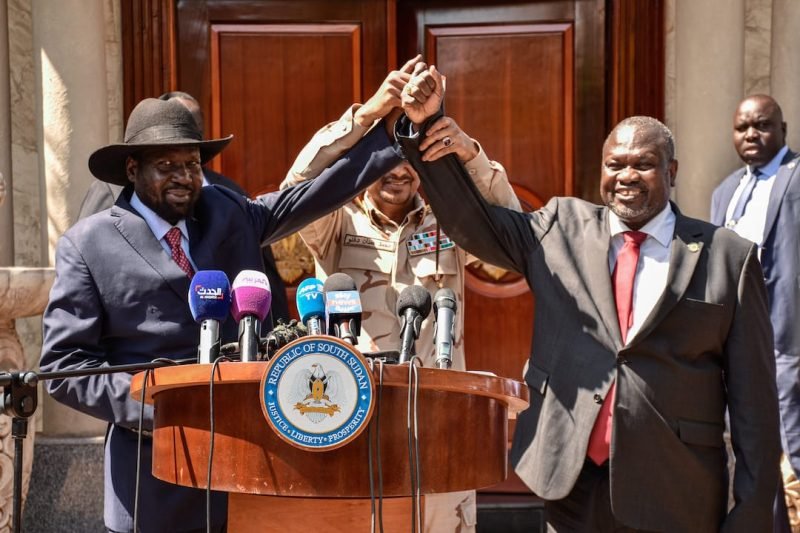
As Juba and opposition forces mobilize, international monitors warn that South Sudan’s unity government is collapsing — a crisis that could redraw East Africa’s fragile balance.
An oversight body tasked with monitoring South Sudan’s 2018 peace agreement has issued a stark warning: both the government and opposition are recruiting new fighters, abducting children, and arming for what could be a return to full-scale war. The findings — presented Tuesday in Juba by the Reconstituted Joint Monitoring and Evaluation Commission (RJMEC) — mark the most serious alarm yet that the country’s tenuous peace is unraveling.
At the heart of the report lies a constitutional crisis with regional and geopolitical stakes. The government’s June decision to recruit 4,000 new soldiers and open a new training center violates the spirit, if not the letter, of the 2018 accord — which requires a unified national army before elections can be held.
Opposition factions loyal to former vice president Riek Machar, meanwhile, are accused of mobilizing their own forces and abducting children into service. Together, these actions erode what remains of the fragile power-sharing framework that ended South Sudan’s last civil war.
The RJMEC’s interim chairman, George Aggrey Owinow, warned bluntly that “if the current challenges are not urgently addressed, there is a high risk of reversal of all the gains already made.” His remarks underscore fears that the Kiir–Machar unity government — extended twice beyond its initial mandate — has entered a dangerous limbo: too weak to implement reforms, yet too divided to hold credible elections.
The government’s response was strikingly dismissive. Cabinet Affairs Minister Martin Elia Lomuro sought to calm fears, insisting the situation “will not derail the peace process.” Yet reports from the U.N. and humanitarian agencies suggest otherwise: civilian casualties have risen nearly 60% since last year, more than 320,000 people have been displaced, and humanitarian access incidents have doubled.
The immediate flashpoint is the prosecution of Machar, now under house arrest and facing charges that include terrorism and crimes against humanity — accusations he denies. His allies say the charges are politically motivated, warning that they risk dismantling the balance of power that has kept the peace deal barely intact. The RJMEC has called for his release, arguing that a fair and inclusive process is essential to prevent renewed conflict.
But the deeper issue is structural. The transitional government’s mandate, designed to integrate rival forces and restore a single national chain of command, remains incomplete. Instead, both sides are rearming — a constitutional breach that undermines state legitimacy.
Regional actors, particularly the Intergovernmental Authority on Development (IGAD), which brokered the peace, face growing pressure to intervene decisively.
South Sudan’s instability is not just a domestic affair. Its collapse would reverberate across a volatile region already stretched by wars in Sudan and the Congo.
A renewed conflict could send hundreds of thousands fleeing into neighboring Uganda, Kenya, and Ethiopia, destabilizing borders and humanitarian corridors.
The RJMEC’s report is more than an administrative rebuke — it is a final warning that South Sudan’s peace deal is disintegrating from within. Without swift international mediation, enforcement of disarmament provisions, and constitutional clarity on power-sharing, the world’s youngest nation may once again slide into war — a failure not just of leadership in Juba, but of the international system that pledged to help it stand.
Report
Al-Shabaab’s $200 Million War Chest Fuels Somalia Insurgency, Report Finds

Al-Shabaab has become al-Qaida’s most lucrative franchise, generating as much as $200 million a year through a system of forced taxation, extortion, and illicit trade that now underwrites a growing insurgency across Somalia, according to a new counterterrorism assessment from the Combating Terrorism Center at West Point.
The report, The Global State of al-Qa‘ida 24 Years After 9/11, describes the group’s financial network as “sophisticated and institutionalized,” rivaling the Somali state in reach and efficiency.
Revenue from road levies, smuggling, and remittance skimming sustains an estimated 18,000 fighters, enabling the militants to retake strategic ground in central and southern Somalia, including Adan Yabaal—a key crossroads northeast of Mogadishu.
Residents and traders say payments, often framed as zakat, or Islamic alms, are demanded at every level of commerce.
Transporters, herders, farmers, and importers pay fees simply to move goods. In many regions, businesses find Al-Shabaab’s parallel system more reliable than federal or regional authorities, even as it funds the group’s campaign of violence.
Flush with cash, the militants have regained momentum after early setbacks during President Hassan Sheikh Mohamud’s 2022 offensive.
Their capture of Adan Yabaal has reopened a vital corridor linking Mogadishu to central regions, turning the town into a staging hub for fighters and supplies.
The setback highlights persistent weaknesses in Somalia’s security forces, which struggle to hold territory despite support from clan militias and African Union troops.
The United States has carried out 71 airstrikes in Somalia this year, targeting training camps and leadership compounds, while the U.S.-Gulf Terrorist Financing Targeting Center froze assets tied to 15 Somali financiers in April.
Somali authorities have also tightened regulations on informal hawala networks and frozen hundreds of accounts linked to suspected tax collectors since 2025.
Yet the CTC warns that shifting Western priorities toward great-power competition has given al-Qaida affiliates in Africa greater room to operate.
For ordinary Somalis, the result is a landscape of overlapping demands—government levies, clan militia fees, and Al-Shabaab’s relentless extortion—that leave traders and families caught between fragile state institutions and militant coercion.
The report concludes that while al-Qaida’s senior leadership has eroded, its African affiliates, particularly Al-Shabaab, now serve as the financial backbone of the global network.
In Somalia, the militants’ ability to tax, collect, and spend at scale has made financing not just a tool of insurgency but the core of their war effort.
Report
Somaliland Recognition: A Strategic Necessity, Not a Risk
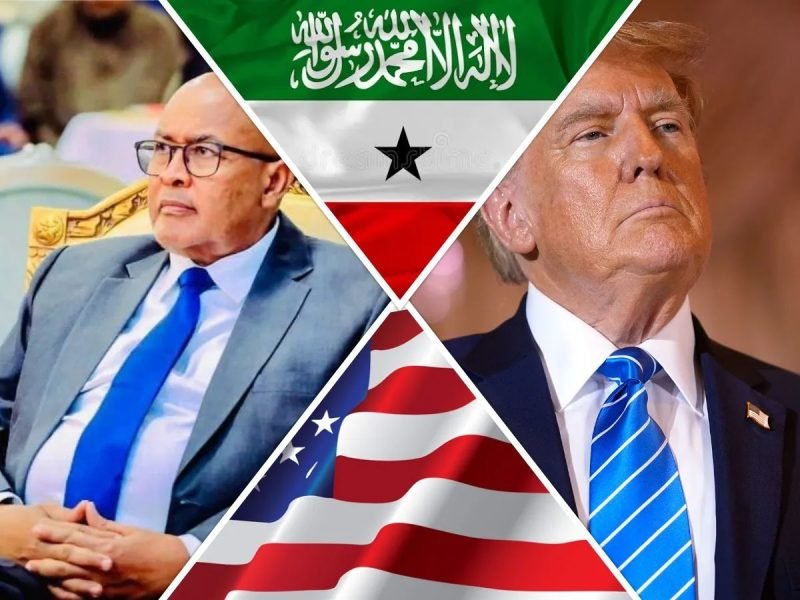
Washington’s Dilemma: Ditch Somalia for a Strategic Somaliland Base?
The Swedish Defence Research Agency’s recent report paints Somaliland’s recognition as a destabilizing gamble, but this framing underestimates both Somaliland’s record and the shifting global order. Far from opening a “Pandora’s box,” recognition would reward stability, secure a strategic ally, and serve long-term U.S. and Western interests in the Horn of Africa.
The Stability Myth Exposed
For three decades, the international community has clung to the fiction of a “One Somalia” policy — hoping against reality that Mogadishu could unify a fractured state.
That experiment has failed. Somalia remains engulfed in clan divisions, corruption, and the enduring threat of al-Shabaab. Somaliland, by contrast, has built democratic institutions, organized peaceful transfers of power, and provided a level of stability unmatched anywhere in the region.
To argue that recognition would “weaken counterterrorism” is to ignore the fact that Mogadishu’s instability itself fuels extremism. Strengthening Somaliland gives the West a firmer foothold against al-Shabaab.
African Union Fears Overblown
The AU’s opposition is rooted less in principle than in fear. The notion that Somaliland would trigger a wave of secession ignores its unique history: a former British protectorate that entered — and then lawfully withdrew from — a voluntary union.
Somaliland’s claim is not a breakaway rebellion but a restoration of sovereignty.
Treating it as equivalent to other separatist movements is a category error. Recognition here would establish clarity, not chaos.
Strategic Imperative for the West
Geography alone makes Somaliland indispensable. The port of Berbera sits at the gateway to the Bab al-Mandab Strait, a lifeline for global shipping and energy flows.
China already operates a base in Djibouti — right next to the U.S.’s only permanent base in Africa. Continuing to ignore Somaliland hands Beijing leverage. Recognizing it would open the way for U.S. basing rights, enhanced maritime security, and secure access to critical minerals at a time when global supply chains are under siege.
The Cost of Delay
Washington and Brussels risk repeating the mistakes of the past by waiting for consensus that will never come. Every year of hesitation drives Somaliland closer to alternative partners — from Taiwan to potential overtures by Beijing itself.
The West must decide whether to treat Somaliland as an opportunity or as a bargaining chip sacrificed to maintain illusions in Mogadishu.
Recognition as Realism
Somaliland does not need to prove its viability — it has already done so for 34 years. What remains is for the international community to abandon outdated frameworks and recognize what is obvious on the ground: Somaliland is a functioning state that has earned its place among nations.
Recognition would not destabilize the Horn; it would anchor it.
Corruption
Somalia Remains Among World’s Most Corrupt Nations, Transparency International Report Finds

Somalia’s corruption index drops again, reinforcing concerns over governance, security, and economic stability.

Somalia has once again been ranked among the world’s most corrupt countries, according to Transparency International’s 2024 Corruption Perceptions Index (CPI). With a score of just 9 out of 100, the country slid further down the rankings, securing the 179th spot out of 180 nations, second only to South Sudan.
Despite government pledges to tackle systemic corruption, the reality paints a grim picture: public funds disappear into the hands of officials, judicial institutions lack the power to prosecute wrongdoing, and bribery remains the norm in every sector. The security forces, already battling Al-Shabaab insurgents, have seen their budgets gutted by corrupt officials, further destabilizing the nation.
Anti-corruption measures, such as the establishment of the Office of the Auditor General and procurement oversight reforms, have done little to halt the tide of fraud and embezzlement. Political interference ensures that high-profile figures remain untouchable, while millions in international aid vanish without accountability.
Beyond governance, corruption is crippling Somalia’s economy and exacerbating the effects of climate change. Donor funds meant for disaster relief are siphoned off, and critical infrastructure projects remain incomplete. Meanwhile, foreign investors remain wary of engaging with a nation where fraud and mismanagement are the status quo.
Somalia’s worsening ranking reflects a broader trend in the region, with Sudan and South Sudan also among the worst offenders. Ethiopia and Kenya, while performing slightly better, continue to struggle with deep-rooted corruption, particularly in procurement and law enforcement.
With corruption now deeply embedded in Somalia’s political and economic fabric, the future remains uncertain. Without drastic action, the country risks further descent into instability, ensuring that development, security, and public trust remain elusive.
Report
Over 1,000 Tons of Missile Fuel Chemicals En Route to Iran from China

Report highlights a significant shipment of sodium perchlorate destined for Iranian missile programs, raising international concerns.
Iranian cargo ships are reportedly transporting over 1,000 tons of sodium perchlorate from China to Iran, a shipment that has raised alarms among Western security officials. Sodium perchlorate, a critical ingredient for producing ammonium perchlorate, is essential for solid-fuel missile propellants. The shipment could significantly bolster Iran’s missile capabilities.
Details of the Shipment
According to reports, the Iranian vessels Golbon and Jairan are set to carry 56 containers of sodium perchlorate to Bandar Abbas, a key port controlled by Iran’s Islamic Revolutionary Guard Corps (IRGC). Western officials estimate that the shipment could produce approximately 960 tons of ammonium perchlorate, enough to fuel 260 mid-range missiles.
The Golbon departed Daishan Island in the East China Sea earlier this week, carrying 34 containers. The Jairan is expected to depart in February with 22 additional containers. Both ships, flying Iranian flags, will make the journey directly to southern Iran without any planned stops, according to vessel tracking data.
International Concerns
Ammonium perchlorate is controlled under the Missile Technology Export Control Regime (MTCR), an international framework aimed at preventing the proliferation of missile technologies capable of delivering nuclear weapons. This shipment highlights longstanding concerns over Iran’s missile development, particularly given the IRGC’s involvement.
The United States and its allies have historically criticized China for supporting Iran’s military programs. Experts note that China has provided extensive assistance to Iran’s ballistic missile development since the 1990s, including technology, training, and parts. This relationship is believed to further geopolitical goals, such as strengthening ties between Tehran, Moscow, and Beijing in opposition to U.S. influence.
China’s Stance
While the Chinese government has not commented on the shipment, Beijing’s embassy in the U.S. reiterated China’s commitment to Middle East stability and a peaceful resolution of the Iranian nuclear issue. However, analysts view this shipment as part of a broader strategy, including China’s purchase of discounted Iranian crude oil and potential clandestine support for Iran’s missile program to assist Russia in its war effort in Ukraine.
This development underscores the complexities of enforcing international sanctions and export controls. The shipment of missile fuel chemicals from China to Iran not only raises questions about Tehran’s ambitions but also highlights Beijing’s role in enabling its ally’s military capabilities.
As the Golbon and Jairan continue their voyages, international observers will likely focus on whether this shipment signals a broader shift in regional power dynamics and the global enforcement of non-proliferation agreements.
-

 Minnesota2 months ago
Minnesota2 months agoFraud Allegations Close In on Somalia’s Top Diplomats
-

 Middle East2 months ago
Middle East2 months agoTurkey’s Syria Radar Plan Triggers Israeli Red Lines
-

 Editor's Pick2 months ago
Editor's Pick2 months agoWhy India Is Poised to Become the Next Major Power to Recognize Somaliland
-

 ASSESSMENTS2 months ago
ASSESSMENTS2 months agoSomalia’s Risky Pact with Pakistan Sparks Regional Alarm
-

 Analysis2 months ago
Analysis2 months agoTurkey’s Expanding Footprint in Somalia Draws Parliamentary Scrutiny
-

 Analysis2 months ago
Analysis2 months agoRED SEA SHOCKER: TURKEY’S PROXY STATE RISES—AND ISRAEL IS WATCHING
-

 Somaliland1 month ago
Somaliland1 month agoF-35s Over Hargeisa: The Night Somaliland’s Sovereignty Went Supersonic
-

 Somalia2 months ago
Somalia2 months agoIs Somalia’s Oil the Price of Loyalty to Turkey? MP Blows Whistle on Explosive Oil Deal








